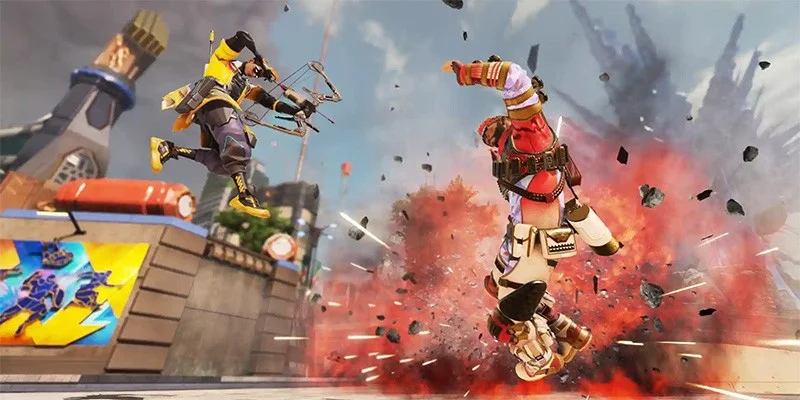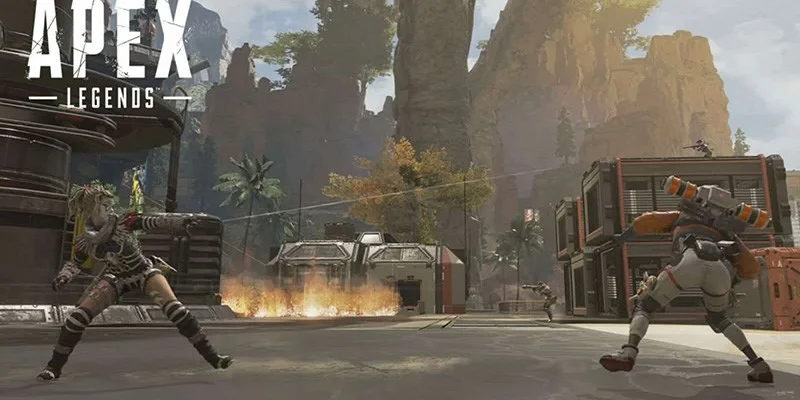What Is Arenas: Duels?
Arenas: Duels strips Apex Legends down to its core. No squads, no healing, no abilities (at least initially), and no excuses. Just you, your opponent, and whoever has better aim and positioning. This limited-time mode arrived with the Future Icons Event and it's probably the most skill-focused thing Respawn has ever added to the game.
How the Mode Actually Works
Each server holds 30 players, but you're fighting one-on-one rounds with completely mirrored setups. Both players get the same Legend and identical weapons, so there's no gear advantage to blame when you lose. The system cycles through different Legend and loadout combinations, preventing duplicates until every possible pairing gets used.
Each session lasts 5 minutes, letting you fit multiple fights into that window. Beat someone and you're straight into the next duel until time runs out. There's no lobby waiting or ranked pressure, just non-stop combat while the game tracks your wins, losses, and damage numbers.
What makes this mode brutal is the complete absence of healing items. Every bullet that connects stays with you for the whole round. Take 50 damage early and you're fighting uphill unless your positioning and aim can compensate.
Why No Healing Changes Everything
Without shields or med kits to bail you out, trading damage becomes a losing strategy. In regular Apex, you might peek aggressively knowing you can heal afterward. Here, that same peek could end your round if your opponent lands their shots first.
You can't afford sloppy positioning or careless peeks. Every decision matters more because there's no safety net. If you miss your opening shots, you better hope your movement is on point, because your opponent isn't giving you a second chance.

Getting Started - Basic Skills You Need
Learn Every Weapon (Seriously)
Since loadouts rotate randomly, you can't just main the R-301 and call it a day. You need working knowledge of every gun in the game, from the Mozambique to the Kraber. Start with understanding each weapon's effective range and damage output.
Hipfire accuracy becomes crucial since many fights happen at close range where ADS takes too long. Spend time learning which weapons you can trust without aiming down sights. The CAR SMG and Peacekeeper, for example, stay accurate enough for hipfire kills, while assault rifles generally don't.
Recoil patterns matter more here than anywhere else. You can't spray and pray when every missed shot gives your opponent an advantage. Pick one weapon from each category and drill their recoil until it becomes muscle memory. Once you've got assault rifles, SMGs, shotguns, and snipers down, you can handle whatever the game throws at you.
Use Your Ears
Audio gives away everything in Duels. Footsteps tell you if someone's rushing or playing cautious. Sprint sounds carry further than walking, so you can often hear opponents coming before they see you. Learn to distinguish between different movement sounds - it helps predict what they're planning.
Most players don't think about their own noise discipline. Walking instead of sprinting keeps you off the radar longer, giving you positioning advantages. If you hear someone sprinting toward you, they probably don't know exactly where you are yet.
Movement Basics That Actually Matter
Stop repeating the same movement patterns. Wall bounces look cool, but doing the same sequence twice makes you predictable. Good players will read your timing and pre-aim your landing spot.
Crouch strafing works because it makes your hitbox irregular. Mix crouching into your side-to-side movement during firefights, as it throws off enemy aim without making you completely stationary. Don't overdo it though. Too much crouching makes you an easy target.
Change directions randomly during engagements. Most players strafe in predictable patterns (left-right-left-right), so throwing in unexpected direction changes keeps them guessing.
Intermediate Strategy - Fighting Smarter
Swap Don't Reload
Reloading gets you killed in Duels. When your primary runs dry mid-fight, switch to your secondary instead of standing there vulnerable. Weapon swaps happen faster than most reload animations, and you maintain damage output.
This means thinking about weapon combinations before each round starts. Some pairings work better for swapping. Pairing a shotgun with an SMG gives you close-range backup, while sniper-to-AR covers long to medium range transitions.
Practice your swap timing. You want it to become automatic when you hear that empty click. Hesitation between weapons gives opponents free shots.
Win the First Peek
First visual contact usually decides the round. Position yourself to see enemies before they see you, not the other way around. This means taking unexpected angles, using elevation, and avoiding obvious sightlines where enemies expect you.
Vertical positioning gives massive advantages because most players think horizontally. Get above your opponent and you force them to adjust their aim upward while you're already lined up for their head level.
Pre-aim common positions instead of reacting to where enemies appear. If there's a doorway or corner where opponents typically emerge, aim there before they show up. Your reaction time drops to zero when you're already on target.
Think About Damage Differently
Since health doesn't regenerate, every point of damage has permanent impact. Focus on weapons and strategies that deliver high damage per shot rather than high rates of fire. Missing half a magazine with an R-99 hurts more than missing two Wingman shots.
Understanding damage thresholds helps with weapon selection. Know how many shots different weapons need to down someone with full shields. This influences your engagement range and weapon priorities for each round.
Don't chase damaged opponents into bad positions. They might be weak, but if they reach cover or high ground, their health disadvantage becomes irrelevant compared to their positional advantage.

Advanced Techniques - Separating Good from Great
Master the Shoulder Peek
Shoulder peeking means exposing just enough of yourself to gather information while minimizing return fire risk. Done right, it baits enemy shots, reveals their position, and lets you plan your real engagement.
Timing is everything with shoulder peeks. Vary how long you stay exposed and when you peek. Predictable timing lets opponents pre-aim your emergence. Quick peeks work for information gathering, while slightly longer ones can bait shots you can punish.
Use shoulder peeks to control engagement timing. Force opponents to shoot first, then capitalize on their reload or repositioning. Patient players often win these mind games.
Off-Angle Positioning
Take positions enemies don't expect. Standard angles become predictable, so find creative sightlines that catch opponents off guard. This requires map knowledge and thinking three-dimensionally about positioning.
Don't hold the same angle for too long. Even great positions become exploitable once opponents figure out where you are. Good players rotate frequently to maintain positional uncertainty.
Look for angles that give you multiple escape routes. Getting the first shot matters, but having options when things go wrong keeps you alive longer.
Damage Per Opportunity
Every engagement opportunity needs to count. Instead of taking marginal shots that might hit, wait for high-percentage opportunities that deliver significant damage. This often means favoring precision over volume of fire.
High-damage weapons like the Wingman and Peacekeeper become more valuable here than in regular play. Landing one good shot creates bigger advantages than several mediocre ones with automatic weapons.
Position yourself for clean shots rather than forced duels. Sometimes the best play is letting an opponent pass by an awkward angle to engage them from a better position moments later.
Optimal Engagement Sequence
Pre-position for advantage, gather info safely, land first damage, then reposition to maintain pressure.
When Abilities Return - Tactical Evolution
Mid-event, Respawn plans to re-enable Legend abilities, transforming pure gunplay into tactical combat. This changes everything about optimal strategy and creates new complexity layers.
Mobility Legends Take Over
Wraith and Horizon abilities will likely dominate once enabled. Wraith's tactical gives free disengagement from losing fights, while Horizon's lift provides instant high ground access. These mobility options break many of the positioning rules that work in ability-free combat.
Prepare for opponents who can escape bad situations or approach from unexpected directions. The permanent damage rule still applies, but mobility abilities create second chances that don't exist in pure gunplay mode.
Defensive and Utility Plays
Newcastle's tactical wall, Mirage's decoys, and Vantage's bat drone introduce defensive and information elements that complicate straightforward dueling. These abilities won't necessarily win fights directly, but they create tactical advantages that good players can leverage.
Defensive abilities become more powerful when health can't regenerate. A small shield or moment of cover provides disproportionate value when opponents can't heal damage they've already taken.
Gravity Lift provides instant high ground access and escape routes. Becomes incredibly powerful once abilities are enabled in Duels.
Into the Void offers free disengagement from losing fights. Perfect for repositioning when caught in bad positions.
Common Mistakes That Cost Rounds
The Chase Trap
Seeing a damaged opponent triggers an automatic chase response in most players. Since they can't heal, you figure they're easy pickings. This thinking gets you killed more often than not.
Damaged players often become more dangerous, not less. They know they're at a disadvantage so they play more carefully, use cover better, and take smarter positions. Meanwhile, you're rushing into unknown territory where they might have superior positioning.
Hold your ground and force them to re-engage on your terms. Maintain angle control and make them come to you instead of chasing into potentially bad situations.
Trading Damage Mentality
Regular Apex teaches you that trading damage is often acceptable because healing items can restore your health advantage later. This mindset becomes toxic in Duels where every point of damage taken is permanent.
Focus entirely on dealing damage without taking any in return. This means passing up aggressive plays that would be fine in normal matches but become losing propositions when health doesn't regenerate. Clean engagements only.
Movement Autopilot
Developing automatic movement responses makes you readable to experienced opponents. Many players unconsciously repeat identical wall bounce sequences, strafe patterns, or peek timing without realizing they've become predictable.
Stay conscious of your movement choices during fights. If you catch yourself doing the same slide or jump sequence repeatedly, force yourself to mix it up. Muscle memory is useful for mechanics, but deadly for patterns opponents can exploit.
Event Context and Rewards
Arenas: Duels anchors the Future Icons Event, which runs alongside 36 exclusive cosmetics and Wattson's evolving Prestige Skin. The free reward tracker lets you earn items through gameplay, with collecting all 36 pieces automatically unlocking Wattson's three-stage Prestige Skin.
Store bundles add cosmetics for Octane, Rampart, and other Legends beyond the free tracker rewards. The event also includes Legend reworks for Wattson and Vantage, which might affect their performance once abilities get enabled in Duels.
Evolves through three distinct stages as you progress through the event rewards track.
Long-Term Potential
The mode serves different player types simultaneously. Aim-focused players get mechanical skill practice, ranked grinders get warmup opportunities, content creators can test individual skill, and casual players enjoy pressure-free combat without ranked stakes.
This broad appeal suggests Duels fills a real gap in Apex's mode lineup. Similar to aim maps in Counter-Strike or VALORANT's range, a permanent 1v1 mode could provide ongoing skill development tools for the community.
Success here might influence whether Respawn keeps Duels as a recurring or permanent feature. The rapid engagement cycle makes it efficient for skill building compared to Battle Royale modes where fights happen less frequently.
Tracking Your Progress
Duels tracks wins, losses, damage output, and kills without ranked pressure or MMR anxiety. Use these stats to identify weak points in your gameplay and focus practice on specific skill gaps.
Consistent damage output indicates good aim and positioning fundamentals. Win rates reflect overall tactical decision-making. If your damage is high but wins are low, you might be taking unnecessary risks or struggling with engagement timing.
The mode's rapid cycle lets you practice extensively in short sessions. You'll get more combat experience in 30 minutes of Duels than in several hours of regular Battle Royale, making it an efficient tool for improvement.

